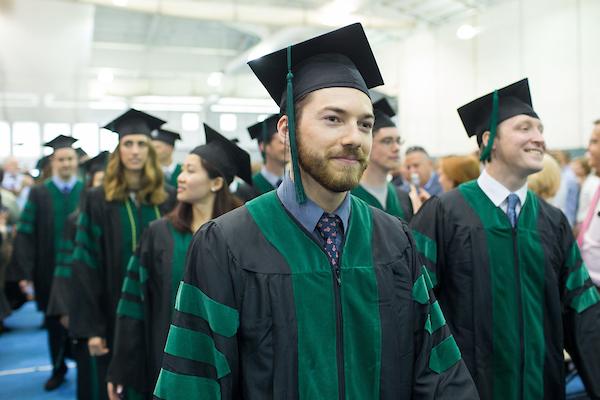-
About
-
Academics
- Physician Assistant
- Special Master’s (MBS)
-
Admissions & Financial Aid
- Tuition & Fees
-
Student Life
-
Research
- Research Labs & Centers
-
Local & Global Engagement
- Global Health Program
Caps Off
The 2018 School of Medicine graduates are ready to tackle health-care challenges

The new graduates of the School of Medicine and the Sackler School of Graduate Biomedical Sciences are poised to make the world a better place, said School of Medicine Dean Harris Berman at commencement exercises on Sunday, May 20.
“The class of 2018 has more interest than previous classes in caring for communities that have been marginalized, specifically prison populations, the homeless, and immigrants,” Berman said to the crowd gathered at the Gantcher Center. “It is powerful to see that the Tufts tradition of serving the underserved—from founding the nation’s first community health centers in the late sixties to fighting Ebola from the frontlines in Sierra Leone—continues to pulse through your veins.”
And as the health-care landscape evolves, graduates now have the tools they need to excel. “You will be going on to participate in programs around the country that will segue into dynamic, fulfilling careers that change lives and impact some of health and medicine’s toughest challenges,” Berman added.
Sackler School Dean Daniel Jay echoed that sentiment when he declared the world in the midst of a “biomedical revolution,” and said graduates “will change human life in ways we cannot yet imagine.” Invoking Dr. Seuss’ Oh, the Places You’ll Go!, Jay named a few students and talked about their diverse backgrounds and where they’re headed. One of the graduates he mentioned, Elizabeth Erin Smith, received her Ph.D. and gave the Sackler student address.
Smith thanked her support system, and then encouraged her classmates to be mentors to young scientists. “Let’s strive to not only be leaders in our future endeavors,” she said, “but also to help the next generation rise to excellence.”
Medical class president Swetha Padma Iruku implored her fellow graduates to remember the faculty, friends, family members, and patients who made the last four years possible. “If I’ve learned anything over the last four years,” she said, “it’s that medicine is hard, but the people make it worth it.”
At a ceremony for the School of Medicine’s Public Health and Professional Degree Programs at Cohen Auditorium—one that saw the school’s first graduate with a Doctorate of Public Health—Dean Aviva Must said that multidisciplinary approaches will be needed to tackle today’s complex health issues, such as bacterial antibiotic resistance, the opioid epidemic, and gun violence.
“It has been our privilege to guide your learning and to learn from you,” Must said. “The responsibility is now yours to keep up that education, stay abreast of new information, and most importantly, consider new perspectives.”
Lisa Carron Shmerling, MG14, vice president of legal at Decibel Therapeutics, Inc., gave the alumni address, and James J. O’Connell, president of the Boston Health Care for the Homeless Program, delivered the faculty address.
In her class address, Public Health Student Senate president Kamisha Charles said she was first attracted to Tufts by this line in the medical school’s mission statement: “To serve and advocate for all people, especially underserved and vulnerable patients and populations.” And in the current national climate, as more and more people’s rights are being infringed on, “advocacy has never been more urgent or important,” she said. “Advocacy is not a sprint; it’s a marathon. We have to work at things little by little, continuously building on the movements that came before us.”
This article originally ran in the Summer 2018 issue of Tufts Medicine.